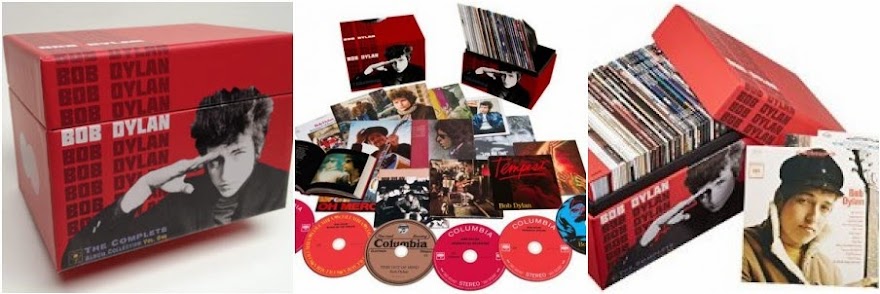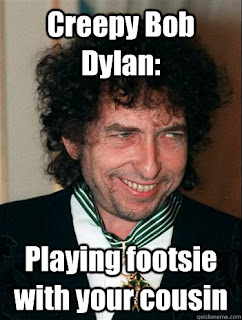On their own, both Dylan and Christmas can be very polarising subjects, so you can just imagine how the combination of the two split the opinions of critics and the public at large on its release. Happily, I'm a huge fan of Christmas music, and since I began the BobBox blog back at the start of this year I've steadily become a fan of Dylan too, so you won't be surprised to hear that I loved CITH, which is the most surreal, fun, shmaltzy, likeable and daft thing he's ever recorded, and reveals Bob to be the coolest of Christmas cats, albeit one that sounds as though he's trying to dislodge a series of massive furballs from his airway.
He's joined by the same members of his touring band as appeared on his last album (including David Hidalgo from Los Lobos), with the addition of Patrick Warren on a variety of keys, R&B guitarist Phil Upchurch, and a Mike Sammes Singers-style vocal group of wholesome sounding guys and gals. Bob, producing under his suddenly very appropriate moniker of Jack Frost, plays it absolutely straight with smooth, traditional arrangements and an old-fashioned, sweet, but not sickly sound. Steel guitar and violin lend a gentle country air, and occasional sleigh bells add a bit of tinsel about the place. Those familiar with his most recent work will know that his singing voice is now very gruff and phlegmy, which for me contrasts wonderfully with this conventional backdrop, although it may come as a shock to those unaware that his vocals these days resemble the gargle of someone who's swallowed a packet of razorblades and washed them down with a bottle of Harpic.
On first listen, my main reaction was that of hilarity, from the opening Here Comes Santa Claus with its ching-ching-ching sleighbell intro, brushed drums and Jordinaires-style male backing chorus, to the end of final track O' Little Town Of Bethlehem with its closing "amen", as Dylan weakly croaked his way through all forty-two minutes like a drunken hobo crashing a carol service. Indeed, the album's comedy value is absolutely priceless. But this sense of amusement - which didn't wane over subsequent listens - was soon joined by a glow of sentiment and admiration when it became clear that CITH is no tongue-in-cheek, countercultural exercise in irony, but a sincere, heartfelt attempt to share some beloved childhood songs and actual Christmas cheer.
On nearly all of the songs, the boy-girl choir not only provides backing vocals, but also trades lines with Dylan, sometimes taking an entire verse or chorus before handing the reins back. The best example of this is Winter Wonderland, where the ladies sweetly sing,
"In the meadow we can build a snowman,
And pretend that he's a circus clown,
We'll have lots of fun with Mr Snowman..."
before Bob gleefully chips in: "Until the other kids all knock him down!".
 |
| This image of model Bettie Page appears inside the jewel case version of the CD, and is included in the hardback book accompanying the BobBox set. |
His Latin pronunciation in the first verse of O' Come All Ye Faithful (Adeste Fideles) needs a bit of work, but it's charming nonetheless, as are the warmhearted renditions of The First Noel, where the choir take the middle verse, and Silver Bells, which Dylan sings alone. Hark! The Herald Angels Sing is rather a hoot, with the soft female bvs bringing Bob's wheezy yelp into sharp relief as he strains to hit the high notes.
The most fun to be had is from the less traditional numbers. "Aloha-ay, aloha-ay" coo the ladies as Dylan sings on Christmas Island of spending the holiday away across the sea. The gals counter with lines about stockings hung on a coconut tree and presents arriving in a canoe, while Donnie Herron's steel guitar sways in the background like a hula girl. The Christmas Blues is a tremendous whisky-soaked Dean Martin cover where all Santa brought our hero was a case of the blues. There's even a now-rare snippet of harmonica before a repeat of the last verse.
Best of all though is Must Be Santa, a demented polka on which Bob plays to his strengths of singing fast and cramming loads of words into each line without tripping up. He uses the Brave Combo's arrangement (which he played on his 2006 Theme Time Radio Hour Christmas special), pairing furious accordion with jolly call-and-response lyrics, with his own twist of substituting the names of past American Presidents with some of Santa's reindeer. It's awesome, and the video is pretty great, too.
The most fun to be had is from the less traditional numbers. "Aloha-ay, aloha-ay" coo the ladies as Dylan sings on Christmas Island of spending the holiday away across the sea. The gals counter with lines about stockings hung on a coconut tree and presents arriving in a canoe, while Donnie Herron's steel guitar sways in the background like a hula girl. The Christmas Blues is a tremendous whisky-soaked Dean Martin cover where all Santa brought our hero was a case of the blues. There's even a now-rare snippet of harmonica before a repeat of the last verse.
Best of all though is Must Be Santa, a demented polka on which Bob plays to his strengths of singing fast and cramming loads of words into each line without tripping up. He uses the Brave Combo's arrangement (which he played on his 2006 Theme Time Radio Hour Christmas special), pairing furious accordion with jolly call-and-response lyrics, with his own twist of substituting the names of past American Presidents with some of Santa's reindeer. It's awesome, and the video is pretty great, too.
Christmas In The Heart has been on heavy rotation chez moi over the last week and a half, along with Bing, Frank, Gene Autry and the other usual suspects, and I've come to love it as much as them all. In fact, I'd put it right up there with my two favourite seasonal albums, Phil Spector's A Christmas Gift For You and the cheesy but fabulous Tijuana Christmas by the Torero Band (if you're a reader of my other blog, you'll know this is high praise indeed!). It's clear that Dylan is sincere, and I love the way that he's thrown himself wholeheartedly into the album, which is full of Christmas cheer, good will to all men, and an endearing affection for the music of the 40s and 50s.
Yes, his voice these days makes Shane MacGowan sound like Andy Williams, but if you can get past this and surrender yourself to the curious mix of asthmatic lead, angelic backing vocals and traditional instrumentation, it's joyful and triumphant. Christmas music is now a kind of folk music in itself, including the many secular 'pop' tunes that have become part of the Great American Songbook, so it should have come as no surprise when Dylan chose to record his own set. He's been doing this kind of thing for the whole of his career (not least on Self Portrait), and those expecting 'Dylanised' reinterpretations may have been disappointed with the straightforward versions here, but as the man himself said during an interview in 2009, "There wasn't any other way to play it. These songs are part of my life, just like folk songs. You have to play them straight, too".
His festive spirit extends to the donation of all royalties in perpetuity to various charities around the world, which is another great reason to buy it. I'll almost certainly be getting it on vinyl before next year - if indeed I haven't already succumbed by the time you read this. I have to admit that last week, the prospect of listening to this album not only filled me with excitement, but also a small amount of fear; I love Bob and I love Christmas, but what if I hated Christmas In The Heart? Luckily, it's no turkey at all, but the icing on the (Christmas) cake of my Dylan-filled 2015. As Tiny Tim (almost) said: Bob bless us, every one.
Yes, his voice these days makes Shane MacGowan sound like Andy Williams, but if you can get past this and surrender yourself to the curious mix of asthmatic lead, angelic backing vocals and traditional instrumentation, it's joyful and triumphant. Christmas music is now a kind of folk music in itself, including the many secular 'pop' tunes that have become part of the Great American Songbook, so it should have come as no surprise when Dylan chose to record his own set. He's been doing this kind of thing for the whole of his career (not least on Self Portrait), and those expecting 'Dylanised' reinterpretations may have been disappointed with the straightforward versions here, but as the man himself said during an interview in 2009, "There wasn't any other way to play it. These songs are part of my life, just like folk songs. You have to play them straight, too".
His festive spirit extends to the donation of all royalties in perpetuity to various charities around the world, which is another great reason to buy it. I'll almost certainly be getting it on vinyl before next year - if indeed I haven't already succumbed by the time you read this. I have to admit that last week, the prospect of listening to this album not only filled me with excitement, but also a small amount of fear; I love Bob and I love Christmas, but what if I hated Christmas In The Heart? Luckily, it's no turkey at all, but the icing on the (Christmas) cake of my Dylan-filled 2015. As Tiny Tim (almost) said: Bob bless us, every one.
*********
The BobBox will be taking a Christmas break now, and will return in the New Year to finish off the two remaining albums. I hope you can join me then. Merry Christmas! xxx
*****BobBox price check*****
amazon.co.uk - £119.99 (free postage)
Discogs - from £86.98
Spin CDs - £99.99 (free postage)
Bob Dylan Official Store - £175.99
NEW: Sony Legacy UK - £70.00 (plus £10.00 p+p)
All prices correct on 17/12/2015








